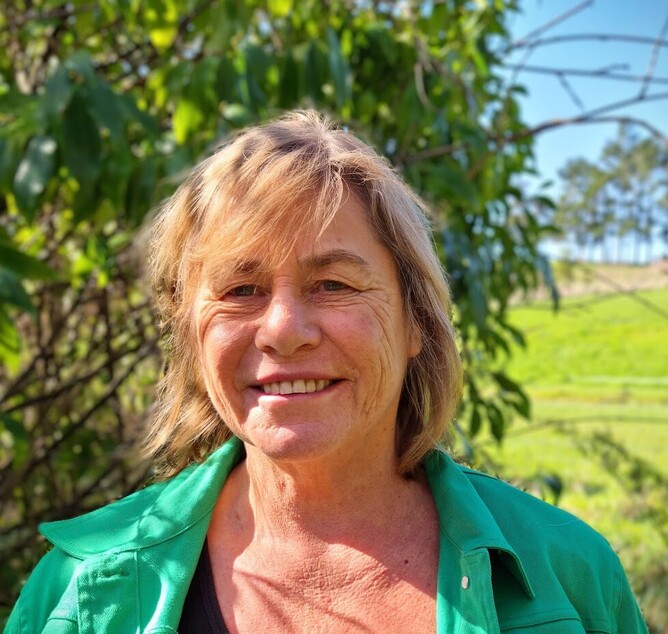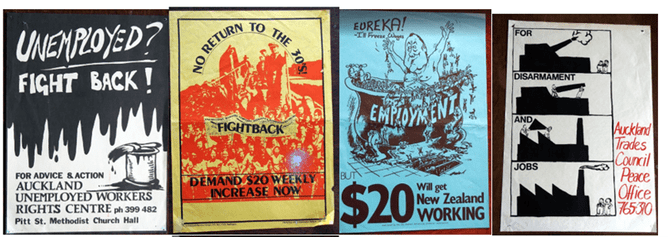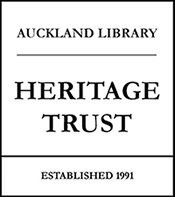We are thrilled to award the 2025/2026 Auckland Library Heritage Trust John Stacpoole Scholarship to Dr Sue Bradford.
Sue is uniquely placed to work on the arrangement and description of a significant archive recently donated to Auckland Libraries by the Kōtare Research and Education for Social Change Trust.
The archive holds items from the 1980s and 1990s, some of which are already arranged and described. What remains to be arranged are the associated poster collection and Auckland Unemployed Workers Rights Centre and Building our own Future materials.
Sue will bring access and discoverability to this archive. The creation of a comprehensive and appropriate finding aid for the different formats in the collection will enable speedier access by library specialists and open the material to future researchers and scholars.
Dr Linda Bryder, ALHT trustee: As a history professor and supervisor of multiple graduate theses, I consider this project extremely valuable. I have found our students increasingly drawn to the late twentieth century in their engagement with the past, viewing it as a fascinating and formative period in New Zealand’s history. Dr Bradford will bring to the task her own insights as a participant in many of the events showcased in the records, enhancing their value. |
Dr David Simcock, ALHT chair: The trustees congratulate Sue on the success of her application for a wonderful project which we look forward to seeing come to fruition. We are very pleased that Auckland Libraries' Heritage Collections will be enhanced by making important archives more accessible for future use in telling more stories about the history of Auckland and, in particular, its economic and social life in the 1980s and 1990s. |
ALHT sincerely thanks all of the applicants who put forward proposals this year and acknowledges the heritage specialists at Auckland Libraries for their ongoing support of ALHT's scholarship programme.
'Mean Times: voices from the archives'
The summary below is taken from Sue's written application.
The value of this material for social history research
In the 1980s & 1990s, Auckland, like the rest of New Zealand, experienced a period of high unemployment due to a combination of global economic downturn and significant domestic economic restructuring. The policy impacts of this time, instigated by local and national governments, were experienced as hardships particularly by beneficiaries and unemployed workers.
As a response, cross-sector organising took place to challenge politically the status quo and to participate in a collective vision for a more just, people-centred way of being – a counter position to the neoliberal reforms and philosophies of individualisation and user pays.
Contemporary students of history, economics and the social sciences are increasingly examining this time to better understand the massive social change that occurred in this period.
Books and academic serials have provided institutional perspectives and analysis. However, less known is the story relating to the grassroots organisation building and responses to those most affected in this time. These stories sit, across several formats, within the archives recently acquired by Auckland Libraries.
Kōtare emerged from a year-long movement-building project called Building our own Future (BOOF, 1993-1994). A group of union and community organisers, Catholic social justice activists, adult educators and Pākehā treaty workers came together to establish a 'school for social change.' Inspired by the desire to create an enduring organisation where skills and knowledge could be passed from one generation to the next, the vision of Kōtare was born.
This is an organised and described archive that includes papers, oral histories and a large unique poster (ephemera) collection that is undescribed and yet to be digitised. The poster collection reflects organising, research and education across this critical era.
Kōtare also houses a second but unsorted collection that both predates and parallels the primary archive. This relates to the work of the Auckland Unemployed Workers Rights Centre (AUWRC) and related organisations and projects, and covers the period 1983-1999.
AUWRC started life in February 1983 at the Pitt St Methodist Church hall in Karangahape Road. In the early days it was mainly a grassroots unemployed and beneficiary organisation providing individual advocacy and collective fightback on a kaupapa of 'Jobs and a Living Wage for All.' However, as unemployment and poverty rose with the Rogernomics 'revolution' of the 1980s and National’s benefit cuts of 1991, AUWRC went on to play a much wider role, including with the establishment of the three Auckland Peoples Centres in the CBD, Māngere and Manurewa (1990 onwards); major street activist coalitions against the ADB, CHOGM and APEC in Auckland during the 1990s; and with helping establish and run the Building our own Future project and Kōtare.
There is a small range of related material in existing Auckland Libraries holdings, mainly ephemera. This archive reflects more deeply the point of view of people whose voices are lesser represented in institutional records or larger non-government organisation collections and are often associated for researchers only with negative newspaper headlines. An examination will highlight the organising and resources that represent those most affected in 'mean times.'
The collection will become a substantive primary resource for students and researchers at any level of interest.
What the scholarship will support
Sorting materials through arrangement and description and preparing appropriate finding aids for the AUWRC collection (including related serials, photos and other early Kōtare and BOOF material).
Abstracting a series of oral history interviews recorded in 2015 with people from the 1988-1999 Unemployed Movement which sit undescribed in the archive. As time permits, working on poster provenance and links to organisations and events with timelines.
Outputs including a blog and/or podcast interview; a talk that highlights the value and importance of community archives and draws on examples from the archives. Proposed topic 'Mean Times: voices from the archives - reflections on a time of organising in a period of critical social change (1983-1999).'


